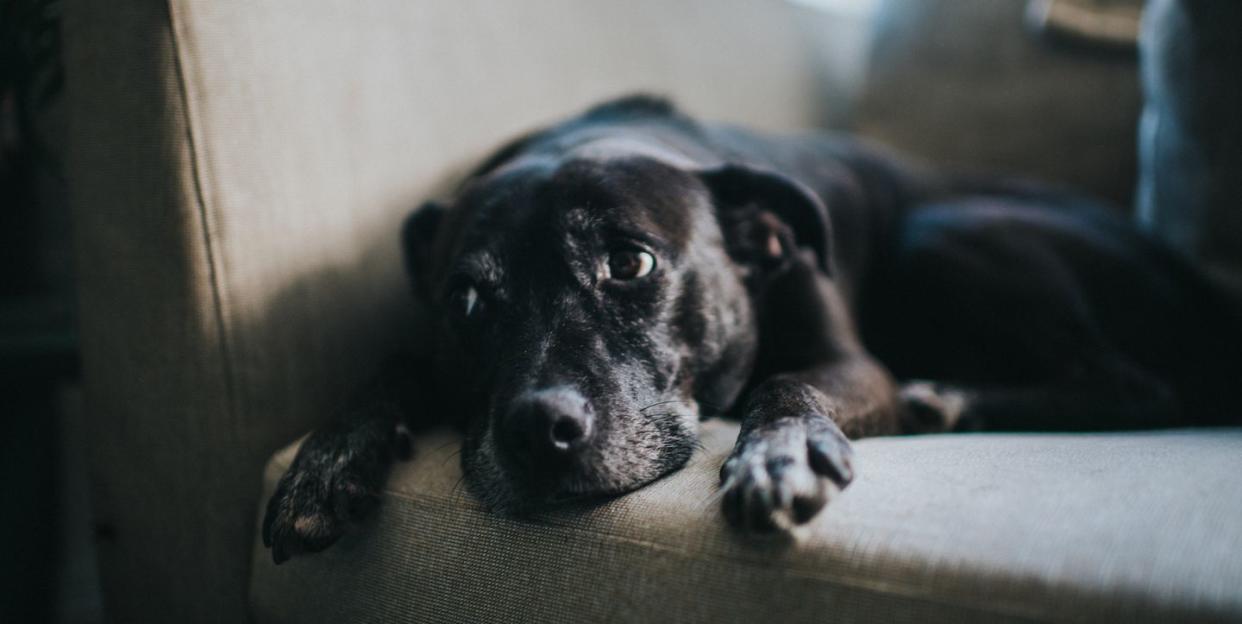11 signs your dog is depressed

Dogs, like humans, can suffer from depression. While depression isn't typically diagnosed in dogs, vets and behaviourists want owners to become more aware of the signs to look out for. With the right support and treatment, you can help your beloved pup through a period of low mood.
According to new research from the Guide Dogs, nearly three quarters of UK dogs show signs of poor mental health, while 8.8 million pups exhibit behaviour indicating anxiety or depression regularly.
They might be man's best friend, but the findings also discovered that a quarter of owners admit they didn't realise a dog could suffer poor mental health, with many assuming they are happy all the time.
Depression in dogs can be triggered by a whole variety of different things, including...
A major change in a dog's family surroundings (such as introducing a new baby, spouse or pet)
On rest from an injury or surgery
An environmental change, such as moving home
A distressing event, such as the loss of a canine companion or owner
An empathy to an owner who is depressed or unhappy themselves
"It may be hard to imagine that your chirpy, tail-wagging friend could get the blues; however, dogs are in fact capable of having depression in the same way that humans are," the experts at Canagan tell Country Living.
"Dogs share many of the same neurochemicals that we do and, like us, they are exposed to certain stress hormones like adrenaline and cortisol – so it follows that dogs may experience something similar to human depression."
It's also worth noting that some dog breeds are more prone to anxiety and depression.
How do you know if your dog is depressed?
The symptoms of depression in dogs can be similar to those in humans, from withdrawing themselves from social situations to being quieter than normal – it can be heartbreaking to watch. Some of the tell-tale signs your dog has depression include...
Exhibiting low activity levels
Loss of interest in the things they once enjoyed
Change to eating habits, often eating substantially less (or not at all)
An increase in amount of time spent sleeping
Showing signs of anxiety or aggression through sporadic howling or whining
Excessive licking, especially to their paws
Flattening of the ears
Less interaction with other dogs
Regression in house and behavioural training
Bored or frustrated
Barking more or being hyperactive

How can you help your dog if it's depressed?
Our dogs can't verbally tell us how they are feeling, so it can often be a challenge to understand exactly what they are going through. Once you have spotted the visible signs of sadness in your pup, it's important you know what can be done to help.
"The first thing that you should do if you suspect that your dog is depressed is seek advice from your vet. Sudden behavioural changes can be the initial signs of illness, so it is important to check that these symptoms aren't happening due to a physical ailment before anything else," the experts say.
1. Offering your dog more attention: One of the best ways to help your sad pup is by ensuring they get more attention. The experts at Canagan explain: "It's important to offer this added attention in moderation as you will need to allow your dog time to deal with their feelings at their own pace."
2. Keep your dog active: Similar to humans, spending time in the fresh air can drastically help to boost your dog's mood. Again, you may need to build this up slowly, but taking your dog out on regular walks will help them both physically and mentally.
The experts say: "When they aren't properly stimulated and can't expend all of their natural energy, a dog's boredom levels can turn into sadness. Just like humans, when dogs are active their brains release dopamine and serotonin - the 'feel good' chemicals which supercharge their mood."
3. Socialising: Dogs are naturally social creatures so, if your pup is feeling a little down, encouraging them to socialise with other furry friends might be just what they need. "This can be achieved perhaps by organising time with other dog friends, through attending doggy day care sessions or perhaps joining training classes," the experts say.
4. Keep a regular routine: Ensuring your four-legged friend knows what they are doing every day will help their recovery process. Whether it's heading out for a walk at a similar time each afternoon or when they can expect to eat dinner, stability in a routine will help them to perk up
24 indestructible dog toys

These toys will provide hours of chewing fun
How to get rid of mites on dogs

Can you give your dog Piriton?

What activities are good for depressed dogs?
If a dog is not restricted in their activities, taking them on walks and to visit new places is great for mental stimulation and distraction, explains Dr Anna Foreman, an in-house Vet at Everypaw Pet Insurance.
She continues: "Being slow and gentle with your animal is key – they may initially not want to interact, or be slow to respond to the efforts.
"Some dogs may feel overwhelmed by new stimuli, and so this is not an appropriate plan for every dog. Some dogs may respond better to a quieter environment, with activities like playing, interactive feeding and stroking/fussing indoors being more appropriate.
"How to help a depressed dog very much comes down to knowing their personality – not every dog will respond the same. The key is patience, and most importantly kindness and love – a universal language all dogs respond to!"
Corduroy Dog Bed - Navy
£105.00 at Country Living Marketplace
Handmade Dog Bandana Scarf
£10.00 at Country Living Marketplace
Waterproof Dog Bed Ascot
£75.00 at Country Living Marketplace
Tartan Dress Lead in Scott Green Ancient
£35.00 at Country Living Marketplace
Dog Harness In Blue and Black Stripe
£38.00 at Country Living Marketplace
Large Tweed Dog Bed In Olive
£75.00 at Country Living Marketplace
You Might Also Like








